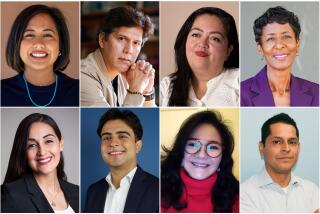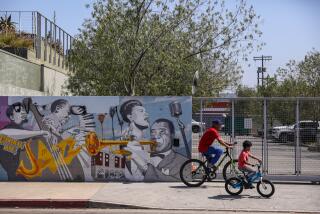Candidates for Mayor Receive Radio Grilling : Politics: Riordan, Katz, Woo and Wachs take some heat from callers and field tough questions during spirited discussion.
The grilling began when the first caller accused mayoral candidate Richard Riordan of insulting Irish people and of acting like a drunk when Riordan told a joke about a pair of Irish drunkards at a city Recreation and Parks Commission meeting last year.
Unbowed, Riordan, a wealthy lawyer and civic activist, chuckled at hearing his own joke repeated over the radio. He said he thought âI could tell jokes about my raceâ and noted that he had already apologized for his remarks.
Moments later, another caller was putting another mayoral candidate on the spot. State Assemblyman Richard Katz (D-Panorama City) was asked what had become of his plan to turn the Los Angeles River bed into a freeway. And what would it be like to drive there on a day like this when even normal freeways are flooded?
â . . . I donât purport to have all the answers,â said Katz, sounding only slightly vexed and insisting that the proposal at least got people thinking about what ought to be done with the river.
Those comments, which aired Wednesday on a public radio call-in talk show, were among several of the most provocative exchanges that have taken place between members of the public and candidates in the early days of the 1993 Los Angeles mayorâs race.
In the hourlong program on KCRWâs âWhich Way L.A.,â four of the leading candidates for mayor took questions from host Warren Olney, and callers offered insights on some of the more troubling issues three months before the April 20 primary.
The candidates were Riordan, Katz and City Councilmen Michael Woo and Joel Wachs. Olney said all mayoral candidates would be invited to be on the show before the primary.
Woo, a two-term councilman who represents Hollywood, faced a question that may go to the heart of his campaign. He was asked why he hasnât been able to exercise stronger leadership on the City Council.
The question echoed longstanding criticism by Wooâs political foes. On several occasions during the past few weeks, Woo has been able to garner only a few council votes for proposals to give the mayor and the council more authority over city department heads, and to balance the city budget and hire more police.
Woo said he had demonstrated strong leadership by taking unpopular stands, such as being the first member of the council to call for the resignation of former Police Chief Daryl F. Gates after the police beating of Rodney G. King. Similarly, he said, he exercised leadership in calling for the legalization of street vending, a proposal that has stirred angry opposition from groups of homeowners and merchants.
âWhen I called for the legalization of street vending, people said, âWhy did you do that, youâre not from El Salvador or Guatemala?â And I tried to explain to them that we need to be encouraging people to work for a living instead of being dependent. . . . Again and again, I have shown leadership by showing I can transcend my ethnic background and represent many different kinds of people, and thatâs the kind of leadership I think we need in this city.â
When Wachsâ turn came, there also was some probing for an Achillesâ heel.
The veteran councilman, who frequently campaigns as a defender of minority rights, was asked to explain why he did not join with Mayor Tom Bradley and Woo in calling for Gatesâ resignation.
âIt was an unpopular stand on your part,â Olney said to Wachs. âHow do you explain yourself?â
âI thought the city was on the verge of being run by grandstanding rather than governance,â Wachs said. When Bradley and Gates were refusing to talk to each other for more than a year, the councilman said, it was he and a few others âwho tried to come in and say letâs negotiate, letâs talk, letâs try to bring about a transition. And ultimately we helped make the impossible possible.â
Riordan, who many people expect to court the cityâs more conservative voters, was asked where he stands on gun control. He said he favored removing guns even if it necessitated a citywide police sweep.
He said a police sweep âgets very complicated but if thatâs the only answer we could come up with, yes, I would be in favor of that, and I would be in favor of much stronger control of gun dealers even to the point of shutting them down.â
Katz, a 12-year assemblyman from the San Fernando Valley, was asked how he could campaign as a leader given his part in last yearâs budget gridlock in Sacramento. And he was asked whether his legislative mentor, Assembly Speaker Willie Brown, would play a role in the mayoral campaign as an adviser or as a fund raiser.
First, Katz insisted that he has been an effective legislator. âI have written laws that have created jobs in California,â Katz said, citing legislation he said raised unprecedented amounts of money for mass transit, streets and highways.
He said he allied himself with Brown because it allowed him to be a more effective legislator.
âI was able to . . . do things for the Valley, like build Mission College and get buildings built at Cal State Northridge because I was part of the leadership,â Katz said.
But Katz pointed out that he broke ranks with Brown âwhen it came to solving fiscal problems in the city of L.A. last year. The speaker wanted to cut $300 million out of the city. I fought that effort and in the end succeeded not only in reducing that down below $50 million but was also able to change the law so that we could transfer $44 million from the port surplus to the general fund to keep cops and firefighters and paramedics on the street.â
As for his friend the Speaker, he said: âWhile Willie Brown is one person there (in Sacramento); he is not the person who is going to be involved in this campaign. This is Richard Katz running for office.â
More to Read
Sign up for Essential California
The most important California stories and recommendations in your inbox every morning.
You may occasionally receive promotional content from the Los Angeles Times.










